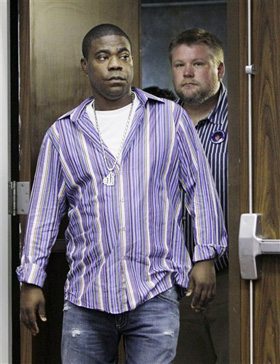 NEW YORK – Who will Tracy Morgan tick off next?
NEW YORK – Who will Tracy Morgan tick off next?
Last month, he offended gays and lesbians with a homophobic rant in a Nashville concert hall, highlights from which were posted online and went viral. Under pressure from a gay-rights group (not to mention the bosses of his TV show, "30 Rock"), Morgan apologized and met with gay-rights advocates.
Then, in a stand-up date last weekend, he comically cautioned against dating women with "retarded kids" and joked about once romancing "a cripple" with a prosthetic arm.
Those zingers would likely have gone unappreciated by anyone other than the crowd at Manhattan's Carolines comedy club. But a New York Times article shared his performance with the civilized world. An advocacy group for the disabled swiftly blasted his remarks as "far too offensive to be excused as comedy" and called for his immediate apology.
This time, Morgan has not responded. But stay tuned. By now, he likely has a target on his back.
Are other social-advocacy groups already lying in wait, positioned to insert Morgan's next round of offending remarks in a statement demanding from him yet another display of contrition, should that group's chosen cause be next on his hit list? And will special-interest groups begin monitoring his concerts, to make sure no insensitive remarks made in the confines of a comedy club before consenting adults go unheard, and uncondemned, by the outside world?
Should a commission be formed, maybe on the model of the once-indomitable Motion Picture Production Code, to make sure comedians heed a proper standard of conduct and avoid the risk of hurting anybody's feelings?
Is Tracy Morgan the new poster child of comedy oppression?
The goal of comedians is tricky and elusive to achieve: to be funny, reliably funny, in a world where disagreement reigns not only about what's funny and what isn't, but about what should and shouldn't be off-limits to humorists.
And comedians, by their very nature, offend. For every squeaky-clean Bill Cosby or Jerry Seinfeld, many more - from Redd Foxx, Lenny Bruce and George Carlin to Sarah Silverman, Chris Rock and Louis C.K. - have stepped on people's toes, unapologetically.
Morgan crossed the line - somebody's line, anyway - in Nashville when he joked that he would "pull out a knife and stab" his son, if the kid confessed to being gay. At least one of the willing ticketholders didn't like the joke and said so on his Facebook page.
Then the whole world got into the act.
Morgan's mockery of the disabled last weekend hasn't triggered nearly so loud an outcry. But beyond simply dismissing what he said as unfunny, why would anybody pay it any notice at all?
Adam Carolla is one observer who wonders what all the fuss is about.
"Tracy Morgan," he says, "is a stand-up. Tracy Morgan is a little bit nuts. And Tracy Morgan does a show for people who enjoy Tracy Morgan. Maybe it's not meant for everybody."
Carolla is a radio and TV personality and comedian who currently hosts a popular talk-show podcast. And he's been embroiled in his own handful of past controversies for on-the-air remarks.
"Tracy Morgan is not a head of state," Carolla says. "He speaks for nobody but himself. I do think there should be a different set of standards for bosses, politicians and cops, versus comedians and talk show hosts.
"You say, `All right, but words incite people.' Then you'd have to get rid of every crime drama on TV, and every video game containing violence, and every movie where there's racism or rape. But are you saying people can be that easily swayed?"
For a comedian, the bottom line is being funny, and Carolla notes that a "normal" view of life doesn't always serve the cause of humor.
"No one makes anybody laugh by going up on stage and saying, `I think Tom Brady is a great quarterback, I love my family, and my wife is smart and nurturing.' You don't want to hear me say that."
Harry Shearer thinks almost anything, no matter how deviant, can generate laughs - that is, if it's properly finessed.
He points to the O.J. Simpson murder trial.
"There's nothing funny about that grisly act that I can see," he says, "but there's a year's worth of funny from all the characters who came out of the woodwork as a result - Kato Kaelin, Judge Ito and the lawyers. That's your job: to go to that space and find the thing that is funny. And it's an adolescent reaction just to say, `Look at this grisly act. I'm going to make fun of it.'
"That," says Shearer, "may be what gets comedians in trouble sometimes."
And then, as if by ritual, apology must follow. Shearer knows all about apologies. An actor, humorist, Spinal Tap member and voice artist for "The Simpsons," he is also the creator-host of "Le Show," a public radio hour of satire and commentary that gathers "The Apologies of the Week" from public figures of all stripes - and every week, there are plenty.
"It becomes like a dance. I'll say something that will piss you off. You'll get upset and make a stink. I'll apologize. And then we go around again."
For an entertainer, it can be a double blessing, Shearer says: First, you get attention for the act deemed offensive; then you get more publicity for saying you're sorry.
So Shearer isn't shedding tears for Tracy Morgan or any comic whose pursuit of laughs lands him or her in a high-profile jam.
"I think if you went to the guys doing 1 a.m. slots at the Comedy Store and said, `How would you feel if one of your lines were picked out of your set that just four drunks are watching now, and all of a sudden you became national fodder for that line?' - most of them would say, `Where do I sign up?'"
Copyright © 2011 The Associated Press. All rights reserved.
- Comment









